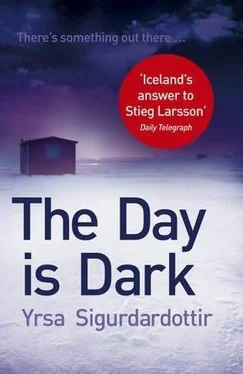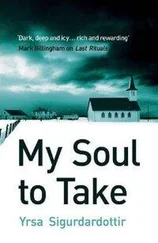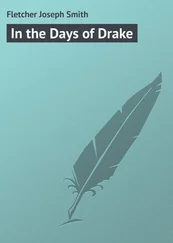Yrsa Sigurdardóttir - The Day Is Dark
Здесь есть возможность читать онлайн «Yrsa Sigurdardóttir - The Day Is Dark» весь текст электронной книги совершенно бесплатно (целиком полную версию без сокращений). В некоторых случаях можно слушать аудио, скачать через торрент в формате fb2 и присутствует краткое содержание. Жанр: Детектив, на английском языке. Описание произведения, (предисловие) а так же отзывы посетителей доступны на портале библиотеки ЛибКат.
- Название:The Day Is Dark
- Автор:
- Жанр:
- Год:неизвестен
- ISBN:нет данных
- Рейтинг книги:5 / 5. Голосов: 1
-
Избранное:Добавить в избранное
- Отзывы:
-
Ваша оценка:
- 100
- 1
- 2
- 3
- 4
- 5
The Day Is Dark: краткое содержание, описание и аннотация
Предлагаем к чтению аннотацию, описание, краткое содержание или предисловие (зависит от того, что написал сам автор книги «The Day Is Dark»). Если вы не нашли необходимую информацию о книге — напишите в комментариях, мы постараемся отыскать её.
Already an international bestseller, this fourth book to feature Thóra Gudmundsdóttir ('a delight' – Guardian) is chilling, unsettling and compulsively readable.
The Day Is Dark — читать онлайн бесплатно полную книгу (весь текст) целиком
Ниже представлен текст книги, разбитый по страницам. Система сохранения места последней прочитанной страницы, позволяет с удобством читать онлайн бесплатно книгу «The Day Is Dark», без необходимости каждый раз заново искать на чём Вы остановились. Поставьте закладку, и сможете в любой момент перейти на страницу, на которой закончили чтение.
Интервал:
Закладка:
‘Does anyone know how long the storm is supposed to last?’ asked Thóra, looking out into the heavy blizzard. It was starting to grow light, although visibility was still poor because of the snow. ‘We can’t investigate the area much if it keeps coming down like this.’ Just that moment another gust struck the window, making it wobble.
‘I think it’s supposed to subside tonight,’ said Matthew. ‘It can hardly continue much longer than that.’
The doctor snorted loudly. ‘Storms here can last much longer than half a day. You might as well resign yourselves to this one lasting for days. Hopefully it won’t – but you never know.’
Thóra scowled. ‘Oh, that’s just great .’ She put down her camera. Data collection had begun, and although it wasn’t entirely clear to her how photos of the bones in the drawers could help the bank and Berg Technology in their negotiations with Arctic Mining, it might. Admittedly, it could affect the status of the negotiations if the employees of the Icelandic company appeared at worst to be connected to a possible crime, and at best guilty of unseemly conduct with a corpse. ‘I think I’ll go through the office of one of the missing drillers,’ said Thóra to Matthew. ‘Shouldn’t we start with them, just in case there’s something there that could possibly help us find them? You can take the other one.’
They both looked at the doctor. What should he do? Each of them was clearly reluctant to trust a stranger with their own project. The doctor, seeming to sense this, straightened up ceremoniously. ‘Well, I need to collect samples from the taps and elsewhere. We may very well find Legionella pneumophila in the pipes.’ Thóra and Matthew stared at him blankly. ‘Legionnaires’ disease,’ he explained. ‘The bacteria thrives well in little-used plumbing systems and may even have infected the men. The conditions here are ideal for it.’
‘And then they evaporated as a result?’ asked Thóra.
‘No, but they might have tried to seek help and then become too exhausted to reach their destination. Legionnaires’ is a dangerous disease and can even be fatal if left untreated. Or perhaps they made it to a hospital somewhere and couldn’t get in touch with anyone due to their illness.’
Thóra didn’t fancy coffee any more, even if the water came from melted snow rather than the camp’s plumbing system. She and Matthew went to search the offices of the two drillers and discovered quickly that they had shared one room. On the way they passed Eyjólfur, who was sitting in the corridor in a kind of makeshift computer lab. On the screen before him was an indecipherable menu and the young man’s fingers flew over the keyboard. ‘Is everything all right with the system?’ asked Thóra. ‘We’re going to have a look at some of the employees’ computers and we don’t want to damage anything.’
The young man looked up from the screen and smiled at her. ‘You can’t do any harm,’ he said. ‘The system is all right, except that there’s no Internet connection. The servers were turned off, but they’re undamaged and working properly. You can get into them just fine and that’s where all the data relating to the project should be saved.’ He reached for a pen and paper lying next to the keyboard. Something was scrawled on the paper but he tore off a blank strip. ‘Which computers are you thinking of looking at?’
‘The drillers’, to start with,’ she replied. ‘We’ll probably end up looking at all of them but we want to start there.’
‘Then you need passwords.’ He clicked on the mouse to bring up another menu with the names of the system’s users. ‘I have no idea what passwords everyone had but I’ll change them all to the same one.’ He wrote 1234 on the piece of paper and handed it to Thóra. ‘Just use this; the username should pop up after you boot the computer but give me a shout if that doesn’t happen. This should get you into everything. Except the Internet, which is totally down. I’m starting to think the dish has malfunctioned.’
‘The dish?’ Thóra wasn’t particularly familiar with computer systems.
‘We connect to the Internet via satellite dish, but everything suggests it’s kaput. It’s up on the roof, but no one’s going up there in this weather. Hopefully there’s not much wrong with it, then I should be able to fix this. The phones are dead as well, which means the dish they’re connected to is probably also buggered. Bad weather might have damaged both of them, even though they were probably set up to withstand quite a lot.’
The door of the drillers’ office was decorated with a printed-out photo of a fiery red Formula One car. One corner of it was torn and the paper was starting to turn yellow. Two dark stains had appeared on it from the Blu-Tack used to stick it up. Above it was a plate with the names of the two men, Halldór Grétarsson and Bjarki Elíasson. There was something strange about seeing their names there and knowing that things had probably ended badly for them. Thóra and Matthew went into the office, which was quite large and held two desks. The walls were covered with printed-out jokes and photographs of the two drillers grinning at the camera. As Thóra sat down at one of the computers the thought crept into her mind that the men weren’t laughing now, wherever they were. She booted up the computer.
Chapter 8
Arnar Jóhannesson bowed his head, and his neck cracked. He was starting to feel a bit better. The clearer the image had become in his mind, the worse he had felt. It suddenly occurred to him that he could put an end to this misery once and for all. It wasn’t the first time he’d had the idea, but it had become clear to him that he lacked the courage to do so, even though he knew that his reward would be eternal atonement. It was probably fear of failure that stopped him; the idea of waking up at the hospital paralysed or with brain damage was so unbearable that even the hell that was his life was better. He didn’t always feel this bad. He knew the discomfort would pass; the inevitable result of falling, of giving in to the temptation of alcohol that seduced him, promised to alleviate his suffering and dispel the unpleasant thoughts that plagued him. It wouldn’t really matter. The pain was still there, as well as the terrible thoughts, and now self-loathing had been added to the mix. He had given in like a miserable wretch, and for a while he had rejoiced in being a loser.
He stood up and pulled the belt of his bathrobe tighter. He had lost a lot of weight on this days-long binge and he felt like a weakling. All his effort in recent months, weightlifting and running, had come to nothing. Why wasn’t it as difficult to get out of shape as into it? He had put a lot of energy into looking good and being in good condition, and it was no walk in the park. That was probably the greatest indicator of the influence of this disease that he had inherited from his mother. When he drank, he became completely apathetic about the things that mattered to him; the only thing that mattered was the next drink – maintaining the high and ensuring that it never diminished. It had been incredibly easy for him to take the first step in the Twelve-Step Programme: ‘ We admitted we were powerless over alcohol – that our lives had become unmanageable .’ The second step had proven much more difficult. He could thank his lucky stars for having been helped into treatment this time, before he did more damage to himself than excessive weight loss. Usually when he succumbed to temptation, more and more time would pass until he got back on the right track. It had actually been a good long time since he had last stumbled; he had been dry for four hundred and eighty-three days before letting himself be tempted again.
Читать дальшеИнтервал:
Закладка:
Похожие книги на «The Day Is Dark»
Представляем Вашему вниманию похожие книги на «The Day Is Dark» списком для выбора. Мы отобрали схожую по названию и смыслу литературу в надежде предоставить читателям больше вариантов отыскать новые, интересные, ещё непрочитанные произведения.
Обсуждение, отзывы о книге «The Day Is Dark» и просто собственные мнения читателей. Оставьте ваши комментарии, напишите, что Вы думаете о произведении, его смысле или главных героях. Укажите что конкретно понравилось, а что нет, и почему Вы так считаете.












